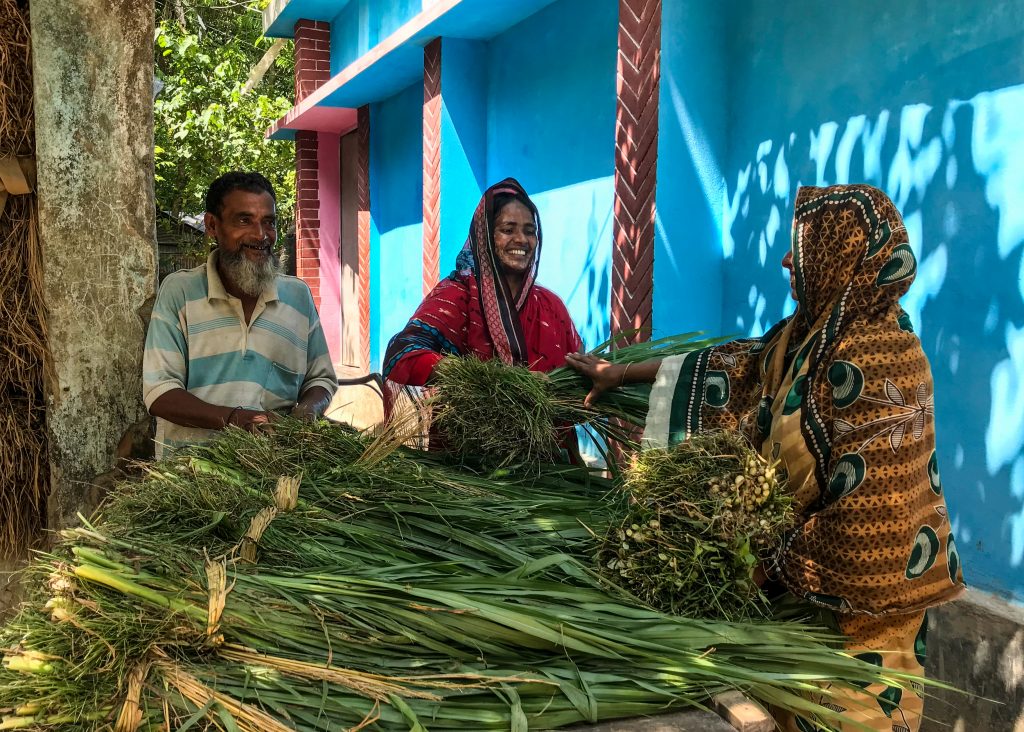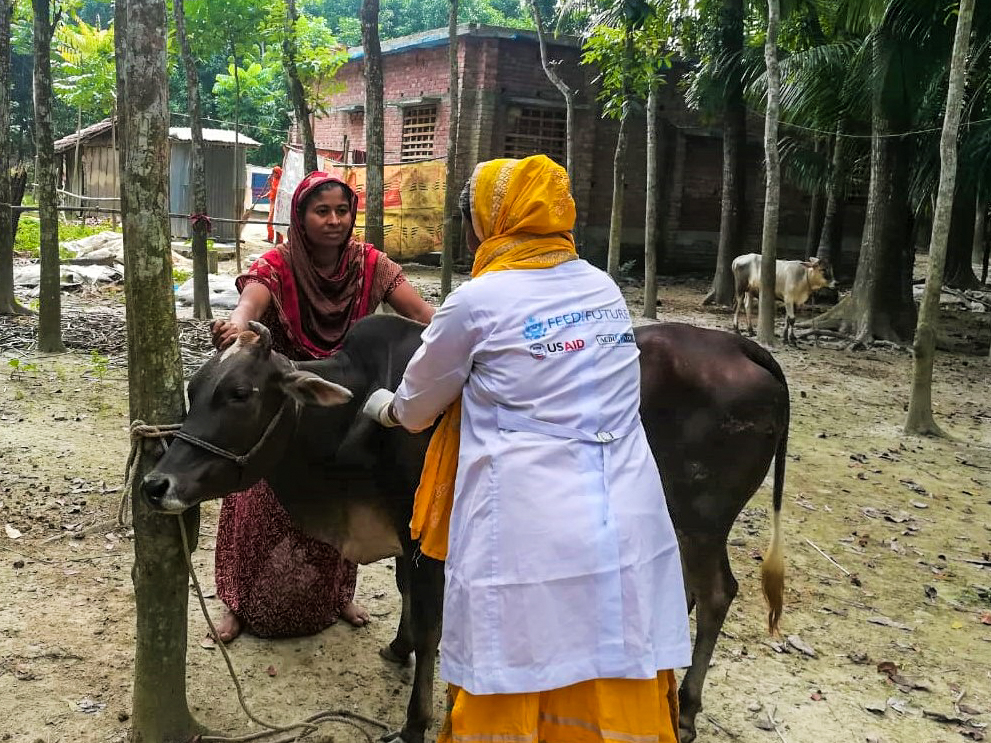Livestock Service Providers Break Gender Biases in Bangladesh
This article in brief:
- Bangladeshi women can make a living through livestock farming, however, socio-cultural norms limit their access to market roles beyond basic farming.
- Male community members often challenge women on their ability to provide services, discouraging them from taking on new roles.
- A Feed the Future program in Bangladesh is helping break down biases against women in agriculture, helping more than 600 women become livestock entrepreneurs and community agents since 2015.
While many women in Bangladesh are involved in livestock farming, socio-cultural norms limit their access to market roles beyond basic farming – such as trading or processing, providing livestock services, or managing livestock-related enterprises, including feed retailers and animal health shops. Tuhina Khatun, a cattle farmer who now also provides primary animal care services to other cattle farmers, experienced this firsthand.
With Feed the Future’s help, she overcame these barriers to become an entrepreneur. And now that she and fellow business owners are grappling with COVID-19’s effects, Feed the Future is helping her and others like her keep their businesses running to provide for their families and communities.

Photo by ACDI/VOCA
Partnering for Progress
Khatun used to work solely as a livestock farmer, but in 2017, she diversified into providing livestock services to other farmers. She had learned at a Feed the Future training about the impact she could have by raising awareness about livestock services and nutrition among families involved in livestock farming. As a new community nutrition agenda, she began sharing with others the nutrition benefits of animal-sourced foods, such as meat and milk.
Khatun’s message was effective as the majority of livestock farmers in Bangladesh are women. Due to social norms, they find it more comfortable and convenient to interact with other women rather than male service providers.
Khatun’s success and enthusiasm got her noticed along with 64 other women leaders like herself. Feed the Future, the Bangladesh Department of Livestock Services and the University of Rajshahi and the Chittagong Veterinary and Animal Sciences University teamed up to train them on livestock health services to further develop their skills and help them capitalize on local demand for female service providers.
This opened new doors for the women, as they now had the potential to earn more income as livestock service providers, enabling them to contribute more greatly to their families’ income and needs, such as paying for school fees and a more nutritious diet.
Breaking Gender Biases
Through the training, Khatun grew her skills in livestock services, including vaccination, deworming, calf delivery and primary disease treatment.
While others doubted that she could handle a large volume of cattle present in her community, Khatun now services 180 livestock farmers per month. She also harvests and sells cattle feed and fodder directly from her farm. As a result, Khatun has doubled her monthly income over the last two years, from $48 to $115, which she is using to purchase more cattle to grow her farming business.

Photo by ACDI/VOCA
“I participated in the training in 2018 as a housewife with zero to limited knowledge about livestock. The training provided me with the knowledge and skills needed to provide livestock services to my community,” Khatun said. My life has changed since then. I have been able to create an identity in my community. I feel proud every time I am able to provide solutions to farm related problems that farmers are facing in my community”.
In January 2020, Khatun secured a job as an animal vaccinator at the local government livestock office, further validating her role in the community.
With a higher income and new job, Khatun changed the dynamics of her family – she earns a stable income, and thanks to the training and skills she developed, she can now provide treatment for her own cattle. Her husband, family and community are more supportive of her work.
“Even if the [Feed the Future] program leaves, what I’ve learned, you can’t take away from me,” Khatun said.
Women entrepreneurs like Khatun are not only transforming the livestock sector and changing gender dynamics, but also contributing to their local economies. Through their work, they are building local capacity, improving nutrition and food security, and encouraging other women to pursue economic empowerment.
Since 2015, more than 600 women are now working across the livestock sector in Bangladesh — as community agents, fodder entrepreneurs, livestock service providers, feed dealers, retailers and dairy processors — after completing Feed the Future’s training program.
Private sector partnerships have made it possible for even more women to complete trainings and become livestock technicians, opening opportunities for them to earn larger incomes and provide a greater range of services to both women and men.
Adapting Service Delivery During COVID-19
When the global pandemic first began, it hurt Khatun’s business as she was unable to provide services or sell products from her home due to movement restrictions.
Once the government lifted restrictions, Khatun adapted her business model and began providing more door-to-door services to reach her clients while limiting COVID-19 transmission through the use of protective equipment, such as masks and gloves, and maintaining a safe distance from the farmers. She also added telephone counseling and advice as well as a mobile app tailored to livestock service delivery as new business service delivery methods to reach clients remotely.
Khatun and other women entrepreneurs in Bangladesh are charting a new future for the country as they help grow markets and incomes across their communities, even during COVID-19. At the same time, with Feed the Future’s help, they are breaking down gender barriers and opening doors for generations to follow.
The Feed the Future Bangladesh Livestock Production for Improved Nutrition Activity is funded by USAID and implemented by ACDI/VOCA. The program increases livestock productivity through helping people access better livestock management techniques, animal healthcare services, and hygienic, diverse, and high-quality food to enhance the nutrition and health of rural families, especially women and children. This project has integrated gender and women’s empowerment, thereby increasing economic opportunities, access to markets, and dietary diversity.
Helpful Links:
- Check it out: What Does It Take to Improve Nutrition? A Livestock Program’s Experience with Social and Behavior Change in Bangladesh
- Learn more: Feed The Future Innovation Lab For Livestock Systems; Feed the Future Bangladesh Livestock Production for Improved Nutrition Activity
Stay connected: Sign up to receive the latest information on the global effort to #endhunger.
